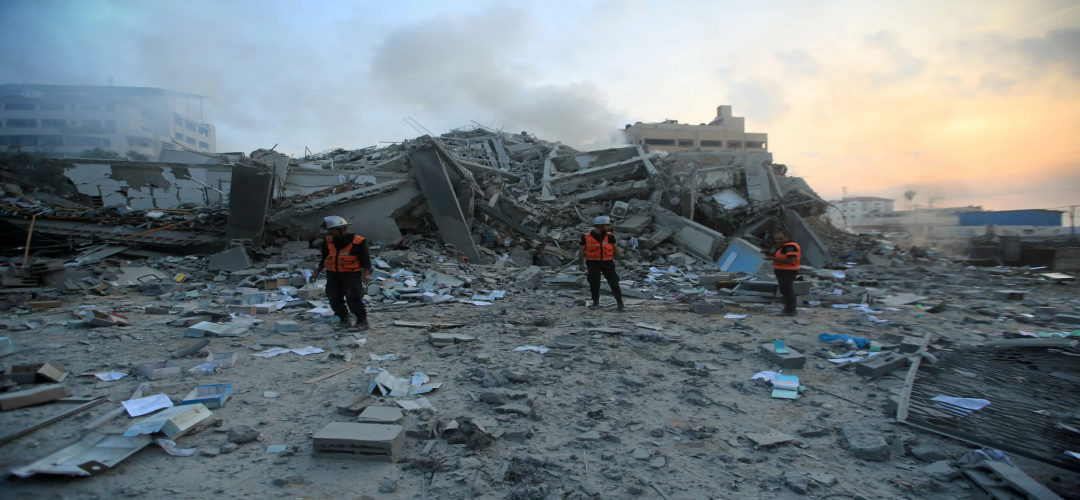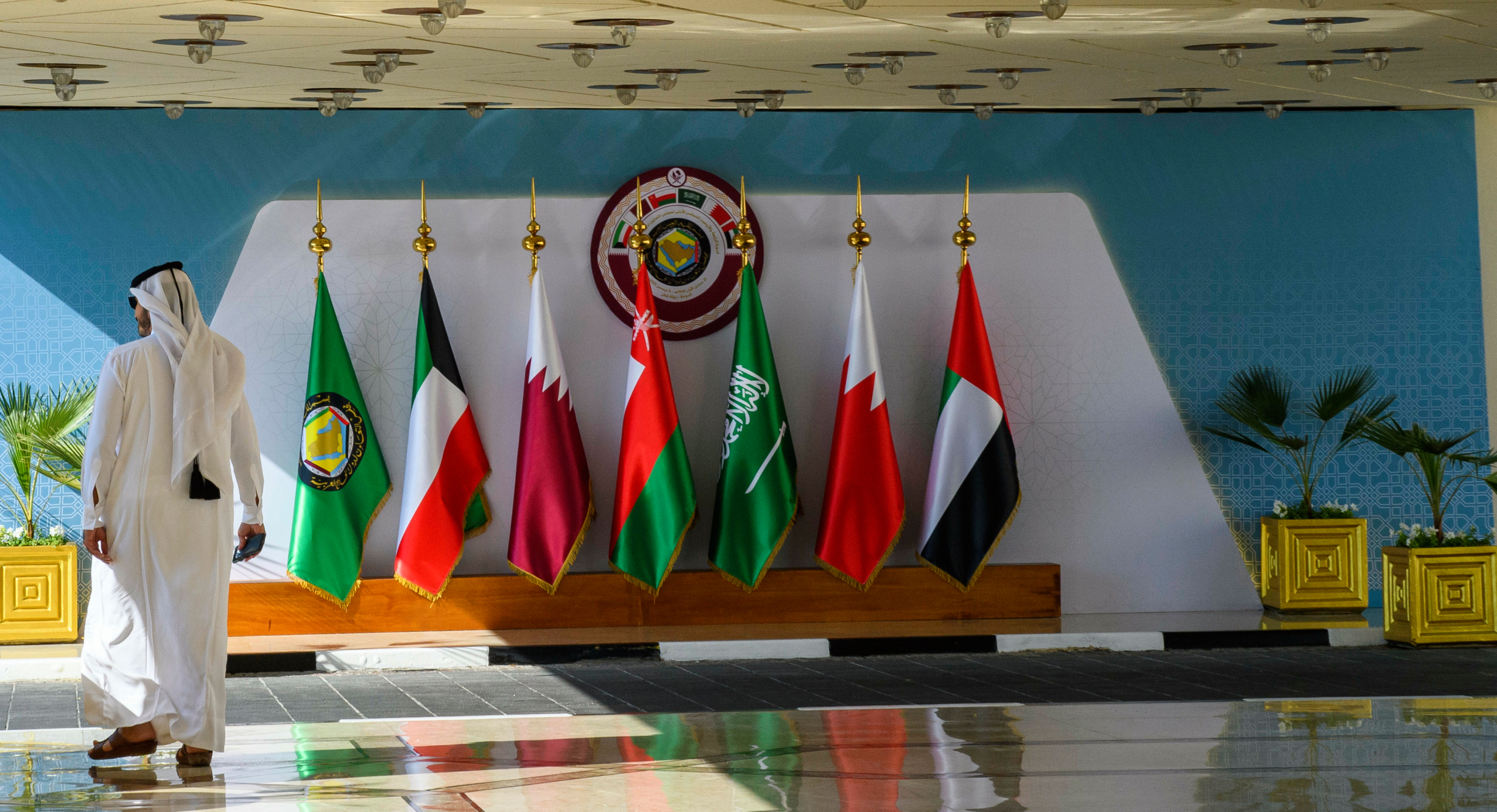Gaza: A Gulf Perspective
January 27, 2024 | Expert Insights

The prosperous, oil-rich Arab states of the Persian Gulf (Gulf States) have strongly criticized Israel’s war in Gaza and called for an immediate ceasefire. A trend of improving relations between them and Israel, the lone ranger in an Arab neighbourhood, came to a stark halt since the October 7th assault on Israel and the consequent Israeli response that has brought utter destruction and death to the Gaza Strip.
Background
A milestone Saudi-Israel normalization deal with U.S. backing was one in a series of reconciling initiatives in the Middle East, particularly featuring Gulf countries. However, this came to a sudden halt when Hamas surprised Israel with the October 7 killing spree and a brutal rampage.
Israel's subsequent all-out offensive against Gaza has triggered a wave of pro-Arab mobilization in the Gulf and renewed popular support for the Palestinian cause. This widespread outcry pushed the Gulf States to take a strong position against the war, even while some were wary of popular demonstrations, such as Saudi Arabia and the United Arab Emirates (UAE), which took strict measures to quell protests.
Yet, none of them are willing to risk jeopardizing their national interests to pressure the warring sides to reach a ceasefire or by putting their forces in harm's way to stop Israel's offensive in Gaza. The stakes are too high to directly confront Israel and the U.S.

Analysis
Qatar has played the most active role in the conflict; leading hostage negotiations deal that paused hostilities. Doha hosts Hamas's political branch, enabling it to play a key role in mediation. However, in addition to being a small state, Qatar is also aware of the bad press it's getting in the West for its ties with Hamas, which has led it to hold back.
Despite its significant leverage over both warring sides, Saudi Arabia has trodden carefully. As leader of the Muslim and Arab world and custodian of Mecca and Medina, it defends Palestine against Israel's onslaught. However, it is keen to preserve its national security interests. These include a possible defence guarantee from the U.S. (as part of a potential normalization deal with Israel) that would deter attacks from Iran or its armed proxies. More important, Riyadh is not too comfortable with Hama emerging from the war an even more potent force as it happened with Hezbollah after the 2006 Israeli invasion. While a normalization deal or any other deal with Israel is off the cards now, it is still a long-term priority.
On the other hand, Saudi Arabia's national security and domestic interests also gear towards de-escalating tensions with Tehran. Keen to diversify its oil-dependent economy, the monarchy prioritises regional reconciliation to support its economic and social reforms. Recent frictions in Lebanon, Yemen, Syria, and recently even Pakistan, related to Iran or its proxy outfits, are a warning to the oil kingdom.
The Houthi attacks on merchant ships in the Red Sea have convoluted the Saudi monarchy’s endeavours to resolve the Yemen conflict. Saudis are reluctant to join the U.S.-led operation against the Houthi rebels, fearful of stoking the ongoing Yemen war and provoking retaliation against themselves.
The UAE and Bahrain, having signed the Abraham Accords normalizing ties with Israel, have now drawn distance from it. Yet, the UAE is keen to maintain ties and eventually use its position as Israel’s most trusted Arab intervenor to have a say in Palestine’s future. Abu Dhabi’s plan for Palestine’s governance (featuring pro-UAE leaders) lacks support from other Gulf countries, particularly Saudi Arabia, its Gulf rival.
The close ties that Hamas has enjoyed with Hezbollah and its mentors in Tehran have not done much to endear Hamas to many Gulf countries. Off the record, many Gulf sheikhdoms would be happy to see the last of radical Hamas and its replacement by a more pliant and moderate Palestinian Authority. Some, like the UAE, openly call it a terrorist organization.
Regional rivalries could crop up in determining post-war Palestine, with not many in favour of seeing Hamas retaining political and military power. This could be the reason for the infinite patience displayed by Israel's Arab neighbours for the last three months while Israel pummelled Gaza into dust. Today, no Gulf State is willing to take measures towards “day after” reconstruction until a ceasefire and a clear commitment from Israel. Understandably, they don’t want to pledge vast amounts towards reconstruction while Israel continues to create debris. They are also averse to legitimising Israel’s bombing cycles. In the past, the EU and the U.S. had generously contributed to Gaza's infrastructure and educational facilities, which ensured that the Strip had a 98 per cent literacy rate in 2020! Now, they, too, would do a double-check before signing the cheque if Hamas ultimately siphons off the money to finance the next blitz on Israel.
Fighting will stop in Gaza under two conditions- one if the unbearable domestic pressure in the U.S. forces President Biden to switch off the American pipeline of weapons and finances. Second, the IDF reaches a culmination point where the application of ever-increasing military force becomes a victim of the law of diminishing returns, not commensurate to the beating that the Israeli economy is suffering in the process.
Assessment
- Israel's relentless bombardment of Gaza has turned the tide as Gulf countries swerve back from reconciling or "normalizing" ties with the Jewish nation. Yet, they are determined to maintain their national interests in the region and not undermine the relations they have developed with Israel, even while they condemn its aggression against their Arab brethren. This is encouraging Israel to prolong the Gaza invasion.
- One thing can be taken for granted: having been bested once, Tel Aviv is not going to allow such a cakewalk again to Hamas or any of their successors, whatever the human, military, social and economic cost.
- As regards the post-conflict management of Gaza, it would be rather hasty to come to any conclusion at this juncture considering the fickle nature of the geopolitical situation in the Middle East. After all, the entire world had put the Palestine problem behind them just four months back since reconciliation seemed so tantalising close, nearly relegating the Palestinian homeland issue into the dustbin of history.








Comments